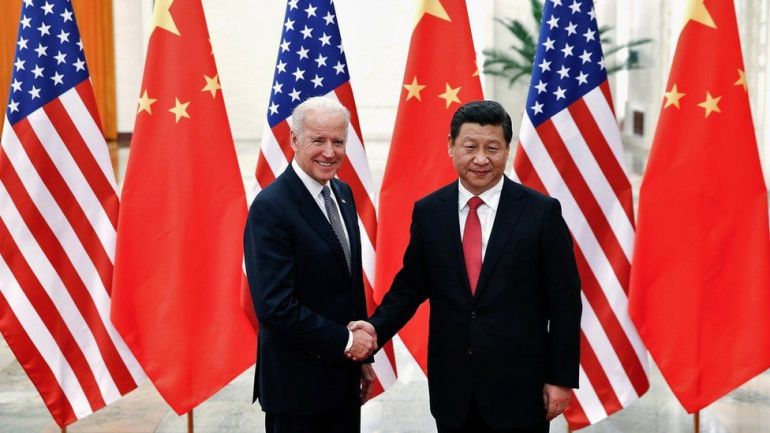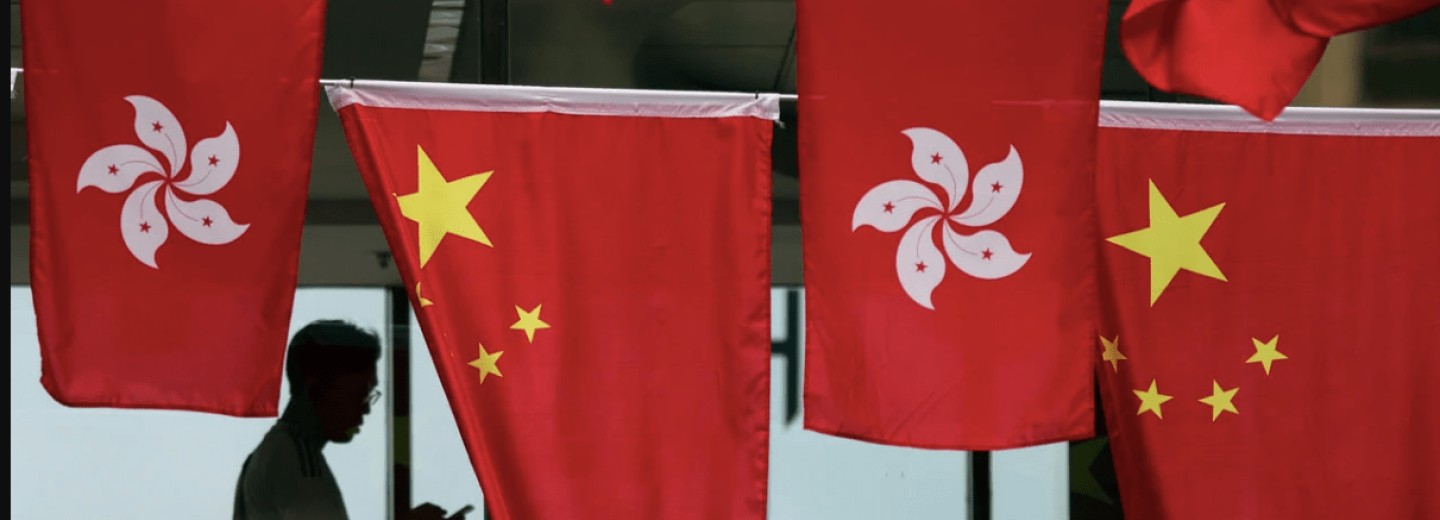China news 26th July 2021
Hong Kong’s recent political changes
Our first news article this week offers a balanced view of Hong Kong’s recent political changes and suggests that Beijing may be more ‘lenient’ with Hong Kong now the political situation has calmed down.
The political situation in Hong Kong has changed greatly in the past year. The report of the Hong Kong Institute of Public Opinion in March this year has shown that 20% of the respondents plan to emigrate. Although some people are still only talking about immigration, many people have taken the first step, and after a few months, the relevant figures are only going to be higher. The immigration wave reflects a prediction of many citizens for the future direction of Beijing’s policy of governing Hong Kong: the era of Beijing’s strict governance of Hong Kong has begun, and the space for “one country, two systems” is getting smaller and smaller.

To grasp Beijing’s intentions for governing Hong Kong, we must first understand that in the eyes of the central government, the passive “one country, two systems” governance method has not worked since the reunification. The SAR government’s serious lack of action has made the deep-seated political, economic and social conflicts of Hong Kong hard for many to accept; hence the riots in Occupy Central, Mong Kok and the turmoil of amendments to the Extradition bill. The central government is now adjusting its thinking in governing Hong Kong.
The series of actions of the regime are extremely rapid and difficult for many citizens to accept. However, the central government is clearly targeting social stability and political order, and it is fighting against the political forces that promote independence.
Needless to say, some people in Hong Kong worry that the CCP will push political correctness to the extreme in this process, and it will make mistakes. This is undoubtedly a challenge for the CCP. It must recognize the inertia of its own system. In the past, there have been crises of preferring left to right.
But on the other hand, Hong Kong people must also realize that the CCP has always been proud of “one country, two systems” and regard it as a model of the system that is of great significance to reform and opening up and the settlement of the Taiwan issue. Since Beijing does not want to see Hong Kong’s “one country, two systems” fail, Hong Kong will certainly not become an ordinary mainland city.
In this sense, the CCP’s actions in the past year have been tough and severe, but it has also formulated the “One Country, Two Systems 2.0” approach to address past problems in a targeted manner. More importantly, “One Country, Two Systems” itself is a dialectical principle that encompasses both strictness and lenient. “One country” is the premise and foundation and tends to be strict. “Two systems” is a political space and tends to be loose. When the bottom line of “one country” is firmly established, it is logical that the “two systems” enjoy greater space. It can be expected that the central government will grant Hong Kong more space to develop its own system.
Source: hk01.com.
US-China relations
Our second article discusses a conference held recently to review US-China relations.
Although Sino-US competition has existed for a long time, it has been four years since the United States experienced Donald Trump and the right-wing rule. After Joe Biden came to power, he continued part of his predecessor’s strategy, related to the new Sino-US Cold War. Especially in mid-July, the White House was still continuing and updating its tough stance on Xinjiang and Hong Kong during the Trump era.
Chinese President Xi Jinping clearly mentioned that China has no intention of fighting a cold or hot war with any country. Biden said that the United States will not fight a new cold war with China but will compete. In other words, both Chinese and American officials have stated that they will not fight a Cold War. However, this does not mean that the United States will not suppress China by means of a form of Cold War. This is related to the United States’ own anxiety about the rise of China and the decline in its self-confidence.

Wu Xinbo, Dean of the Institute of International Studies at Fudan University, believes that strategic and ideological factors, coupled with the inertia of the world leader for more than 100 years, have caused anxiety in the United States.
Why does the United States have such strategic anxiety about China now? Wu Xinbo believes that it is because it cannot accept a reality: For more than 100 years, it seemed that the United States was about to give the first place to another country. This is a feeling. The United States is indeed lacking in confidence.
He also mentioned a deeper problem. He said that the US system is different from China, and it has deep-seated problems, such as racism, especially racism in international relations. This is what the Western theory of international relations pretends to be non-existent. This is reflected in the ‘yellow peril’ theory. This is the United States’ perspective on Asian nations. In the past, the target was Japan, but now it is China.
So, what should China do in the face of American suppression?
Henry Kissinger believes that whether China and the United States are in a cold war and how to avoid the cold war is a two-level problem. First, the international environment and international trends determine the economic and trade relations between China and the United States. This means that it is impossible for most countries to choose sides in economics and trade. Whether it is Europe or Japan, this is the case. This is determined by international trends. The right wing of the United States hopes that other countries will abandon economic and trade ties with China and cut off ties with China. It is simply impossible. This is the big structural factor.
The second is the question of choice. China’s counterattack against the United States is still selective, especially considering the changes in the US political cycle.
In general, scholars still encourage everyone to look for possible counterattack strategies from the Chinese government from official Chinese documents. Some scholars suggested that China should increase competition with the United States in terms of laws, issues, platforms, and international rules. For example, can China also have its own Indo-Pacific strategy to increase the competition for rules and discourse power in the region; whether it can control a certain degree of discourse power in the setting of issues and avoid being unilaterally set by the United States to fall into passivity.
Source: hk01.com.
In an interesting foresight into longer-term trends, this article demonstrates how education is more important to a country’s future than whether it is ‘democratic’ or not.
Sino-US competition ultimately depends on education. After the Chinese Communist Party celebrated its centenary, some Western commentators immediately wrote again saying that China’s “authoritarian system” will eventually collapse. “Western democracy” will eventually triumph – as if this result is inevitable.
These critics of China are deceiving themselves and others.
There is no critical link between “democracy” and technological progress. If such a exists, then China’s challenge is underestimated. It has a clear connection with industrial policy and the technology-oriented education needed to support industrial policy.
In East Asia, Japan, in its imperial period, caught up with the West, and after 1945 it caught up with the West as a bureaucratic and basically one-party country. An important part of this process is the development of education.

Some believe that further progress will depend on democracy. Maybe, but when it comes to China, these and similar words have been said for more than 20 years. At the same time, China’s progress is unstoppable, while the West—especially the United States—has stumbled into chaotic structural adjustments.
As Apple CEO Tim Cook and others have said, China trains far more engineers than the United States. The daughter of a Japanese friend of the author spent a year in an American high school and found that her math level was two to three years ahead of the courses taught in the local school.
In China, building a first-class education system has been a government priority from the beginning. These plans set the direction and goals for establishing a modern education system in China, namely, popularizing high-quality compulsory education, building competitive world-class higher education institutions, and strengthening vocational education. Of course, the goal is to bring the rest of the country up to the standards of big cities. There is no doubt that China will make steady progress.In the United States, this has not been overlooked. Biden’s education plan promises to provide more resources for schools and teachers. The focus is on teacher compensation, teaching materials, equal opportunities for the poor and ethnic minorities, student mental health, dealing with gun violence in schools, and reducing the financial burden of student loans at the university level.
But Biden’s plan is to repair and catch up, not to lead the world. This is a long-term project. At the same time, disputes broke out across the United States—not about the need to upgrade science and engineering education, but about critical racial theories and rewriting American history. The United States is experiencing its own cultural revolution.
Half of the Chinese in the low- and middle-income class have just experienced the best 40 years of history in the past 4000 years. In contrast, the bottom segment of the U.S. population has experienced 30 years of economic stagnation. The outcome of geopolitical competition between the U.S. and China will not be determined by the number of aircraft carriers or nuclear weapons. Instead, it will be up to which country is taking care of its people. In addition, it depends on which country children are more capable of reading, writing and numeracy.
How China might develop in future is unknown. But historically, the changes may be huge. Part of the reason is that China’s economy and society are developing rapidly, and it may also be due to new ideas about government and international relations.
When today’s American children grow up, they may find it difficult to compete with highly educated Chinese workers. There is a problem with the quality of education in the United States. If this problem is not resolved, all the democracy in the world cannot prevent it going backwards.
Source: oversea.huanqiu.com.
Worked on the article:

Wanlikhang





